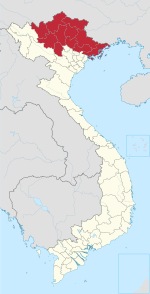Móng Cái
Móng Cái
Thành phố Móng Cái | |
|---|---|
City | |
| Country | |
| Province | Quảng Ninh |
| Area | |
• Total | 515 km2 (199 sq mi) |
| Population (2003) | |
• Total | 72,960 |
Móng Cái () is a city of Quảng Ninh Province in northern Vietnam, on the border with Dongxing city of China's Guangxi Autonomous Region. It has a population of about 103,000. It is known as one of the wealthiest cities in Vietnam with the average income in some areas exceeding US$20,000 per family. One of these areas is the Tran Phu ward.
Economy

The volume of trade between Vietnam and China through the Móng Cái border gate reached US$2.4 billion and 4.1 billion in 2007, 2008 respectively, the highest among the Vietnam-China border gates. The cash flow via the banks located in Móng Cái was VND180,469 billion (US$11 billion). The volume trade is increasing significantly year by year. In particular, counting up to the end of March 2008, the volume trade had reached 720 Million which is equal to 182% in comparison to the same period of last year. The tax revenue of Móng Cái in 2008 was more than 1,700 billion VND (nearly US$100 million) equal to 150% to the year of 2007 result in the fact that Móng Cái is only district level area in northern Vietnam has tax revenue more than 1,000 billion and rank 3rd in whole nation.
Regarding the urbanization, in 2008, Móng Cái has been upgraded to "3rd urban area" in and recognized as city in the end of 2008. Móng Cái is also known as "Market city" because six big markets are located in the city center. Tourists can find anything there.[citation needed]
Tourism
Because of the nearby Trà Cổ Beach, Móng Cái attracts many Vietnamese tourists who come every year from Hanoi or Haiphong, two of Vietnam's biggest cities. With two five-star hotels and a great number of private hotels and guesthouses, it is very easy for Móng Cái to provide more than adequate lodging for tourists.
Language
Many languages are spoken in Mong Cai. Everyone speaks Vietnamese as the native language. Cantonese is widely spoken in center market and English is becoming the second language of the younger generation. Mandarin Chinese is also spoken there, especially in commercial areas.
As of 2003 the district had a population of 72,960.[1] The district covers an area of 515 km².[1]
Climate
| Climate data for Móng Cái | |||||||||||||
|---|---|---|---|---|---|---|---|---|---|---|---|---|---|
| Month | Jan | Feb | Mar | Apr | May | Jun | Jul | Aug | Sep | Oct | Nov | Dec | Year |
| Record high °C (°F) | 31.1 (88.0) |
30.0 (86.0) |
35.0 (95.0) |
33.9 (93.0) |
37.8 (100.0) |
37.2 (99.0) |
38.9 (102.0) |
37.8 (100.0) |
38.9 (102.0) |
36.7 (98.1) |
33.3 (91.9) |
31.7 (89.1) |
38.9 (102.0) |
| Mean daily maximum °C (°F) | 19.4 (66.9) |
19.4 (66.9) |
21.7 (71.1) |
25.6 (78.1) |
30.0 (86.0) |
31.7 (89.1) |
31.7 (89.1) |
31.7 (89.1) |
31.7 (89.1) |
29.4 (84.9) |
25.6 (78.1) |
21.7 (71.1) |
26.6 (79.9) |
| Daily mean °C (°F) | 15.8 (60.4) |
16.4 (61.5) |
18.9 (66.0) |
22.8 (73.0) |
26.7 (80.1) |
28.3 (82.9) |
28.3 (82.9) |
28.3 (82.9) |
27.8 (82.0) |
25.0 (77.0) |
21.1 (70.0) |
17.5 (63.5) |
23.1 (73.6) |
| Mean daily minimum °C (°F) | 12.2 (54.0) |
13.3 (55.9) |
16.1 (61.0) |
20.0 (68.0) |
23.3 (73.9) |
25.0 (77.0) |
25.0 (77.0) |
25.0 (77.0) |
23.9 (75.0) |
20.6 (69.1) |
16.7 (62.1) |
13.3 (55.9) |
19.5 (67.1) |
| Record low °C (°F) | 1.1 (34.0) |
5.0 (41.0) |
6.7 (44.1) |
9.4 (48.9) |
14.4 (57.9) |
18.9 (66.0) |
20.0 (68.0) |
20.6 (69.1) |
16.1 (61.0) |
10.6 (51.1) |
2.8 (37.0) |
3.3 (37.9) |
1.1 (34.0) |
| Average precipitation mm (inches) | 38.1 (1.50) |
58.4 (2.30) |
76.2 (3.00) |
96.5 (3.80) |
304.8 (12.00) |
475.0 (18.70) |
599.5 (23.60) |
571.5 (22.50) |
332.8 (13.10) |
182.9 (7.20) |
81.3 (3.20) |
40.6 (1.60) |
2,857.6 (112.50) |
| Source: Sistema de Clasificación Bioclimática Mundial[2] | |||||||||||||
Administrative divisions
The township contains 8 wards (phường):
- Hòa Lạc
- Trần Phú
- Ka Long
- Ninh Dương
- Trà Cổ
- Hải Yên
- Hải Hòa
- Bình Ngọc
and 9 communes (xã):
- Bắc Sơn
- Hải Tiến
- Hải Đông
- Hải Xuân
- Hải Sơn
- Quảng Nghĩa
- Vạn Ninh
- Vĩnh Thực
- Vĩnh Trung
References
- ^ a b "Districts of Vietnam". Statoids. Retrieved March 23, 2009.
- ^ "Vietnam - Moncay". Centro de Investigaciones Fitosociológicas. Retrieved June 13, 2015.

